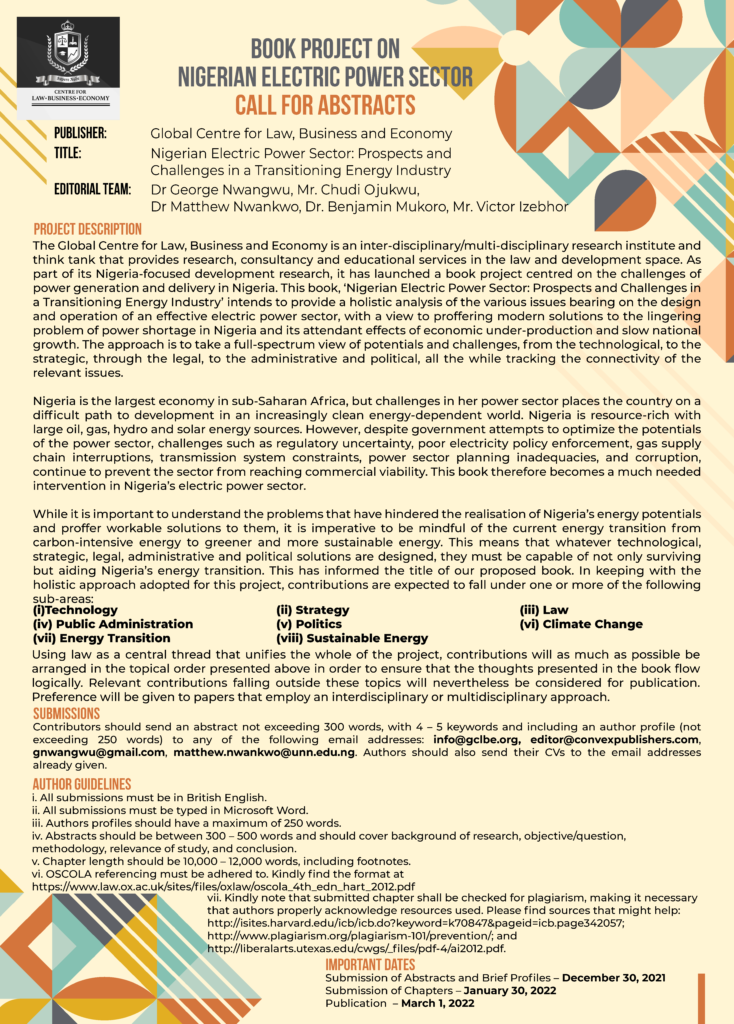Book Project On Nigerian Electric Power Sector Call For Abstracts
Publisher: Global Centre for Law, Business and Economy
Title: Nigerian Electric Power Sector: Prospects and Challenges in a Transitioning Energy Industry
Editorial Team: Dr George Nwangwu, Mr. Chudi Ojukwu, Dr Matthew Nwankwo, Dr. Benjamin Mukoro, and Mr. Victor Izebhor.
Project Description
The Global Centre for Law, Business and Economy is an inter-disciplinary/multi-disciplinary research institute and think tank that provides research, consultancy and educational services in the law and development space. As part of its Nigeria-focused development research, it has launched a book project centred on the challenges of power generation and delivery in Nigeria. This book, ‘Nigerian Electric Power Sector: Prospects and Challenges in a Transitioning Energy Industry’ intends to provide a holistic analysis of the various issues bearing on the design and operation of an effective electric power sector, with a view to proffering modern solutions to the lingering problem of power shortage in Nigeria and its attendant effects of economic under-production and slow national growth. The approach is to take a full-spectrum view of potentials and challenges, from the technological to the strategic, through the legal, to the administrative and political, all the while tracking the connectivity of the relevant issues.
Nigeria is the largest economy in sub-Saharan Africa, but challenges in her power sector place the country on a
difficult path to development in an increasingly clean energy-dependent world. Nigeria is resource-rich with
large oil, gas, hydro and solar energy sources. However, despite government attempts to optimize the potentials
of the power sector, challenges such as regulatory uncertainty, poor electricity policy enforcement, gas supply
chain interruptions, transmission system constraints, power sector planning inadequacies, and corruption,
continue to prevent the sector from reaching commercial viability. This book, therefore, becomes a much-needed
intervention in Nigeria’s electric power sector.
While it is important to understand the problems that have hindered the realisation of Nigeria’s energy potentials
and proffer workable solutions to them, it is imperative to be mindful of the current energy transition from
carbon-intensive energy to greener and more sustainable energy. This means that whatever technological,
strategic, legal, administrative and political solutions are designed, they must be capable of not only surviving
but aiding Nigeria’s energy transition. This has informed the title of our proposed book. In keeping with the
the holistic approach adopted for this project, contributions are expected to fall under one or more of the following
sub-areas:
- Technology
- Strategy
- Law
- Public Administration
- Politics
- Climate Change
- Energy Transition
- Sustainable Energy
Using the law as a central thread that unifies the whole of the project, contributions will as much as possible be
arranged in the topical order presented above in order to ensure that the thoughts presented in the booking flow
logically. Relevant contributions falling outside these topics will nevertheless be considered for publication.
Preference will be given to papers that employ an interdisciplinary or multidisciplinary approach.
Submissions
Contributors should send an abstract not exceeding 300 words, with 4 – 5 keywords and including an author profile (not exceeding 250 words) to any of the following email addresses: info@gclbe.org and editor@convexpublishers.com. Authors should also send their CVs to the email addresses already given.
Author Guidelines
i. All submissions must be in British English.
ii. All submissions must be typed in Microsoft Word.
iii. Author’s profiles should have a maximum of 250 words.
iv. Abstracts should be between 300 – 500 words and should cover the background of research, objective/question,
methodology, the relevance of the study, and conclusion.
v. Chapter length should be 10,000 – 12,000 words, including footnotes.
vi. OSCOLA referencing must be adhered to. Kindly find the format at
https://www.law.ox.ac.uk/sites/files/oxlaw/oscola_4th_edn_hart_2012.pdf
vii. Kindly note that the submitted chapter shall be checked for plagiarism, making it necessary that authors properly acknowledge the resources used.
Please find sources that might help:
http://isites.harvard.edu/icb/icb.do?keyword=k70847&pageid=icb.page342057;
http://www.plagiarism.org/plagiarism-101/prevention/; and
http://liberalarts.utexas.edu/cwgs/_files/pdf-4/ai2012.pdf.
Important Dates
Submission of Abstracts and Brief Profiles – December 30, 2021
Submission of Chapters – January 30, 2022
Publication – March 1, 2022
